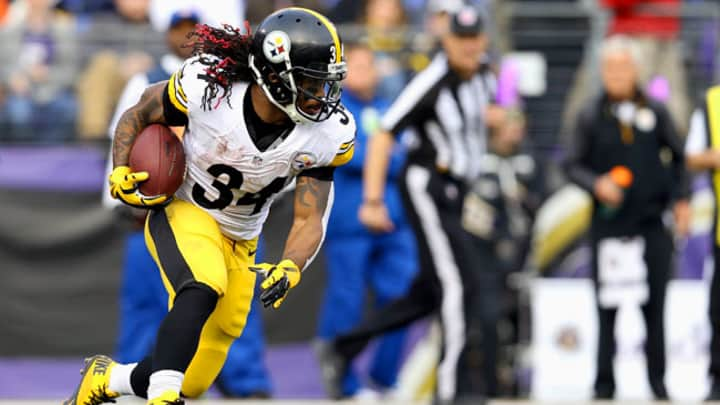Own the Message

You can follow DeAngelo Williams on Twitter, Instagram, and Facebook. This is his second column for The MMQB. His first was about his mother: Wear Pink For My Mom, Who Lived to Love.
By DeAngelo Williams
1. Take control of the message.
I use Twitter, Facebook, and Instagram almost religiously. Here’s why:
Early in my career, if I spoke with a reporter in a locker room and he asked me how I felt about brown cleats, I might give an answer like this, “I don’t have a problem with brown cleats, I think they’re kind of cool, but I could see how I could hate brown cleats.”
The next day’s headline: “DeAngelo Williams Hates Brown Cleats”.
This is why players will say things on Twitter and Facebook they would never say to a reporter. Mainstream media betrayed the trust of many of us and in doing so lost much of its ability to break news. Now players break their own. The very best thing about social media is being able to immediately impact a fan’s perspective or emotions. They get that direct contact with a public figure that they otherwise wouldn’t have. Before social media, to figure out a player’s personality, you had to go through the mainstream media. All that’s over. That’s great.
2. Preserve the moments that matter in a way that matters.
I have videos of my children walking as opposed to having seen them walk for the first time. And that’s okay, because I’ve saved my money and they’re set for life. I gave up an experience of a lifetime for a career in pro football, but technology I couldn’t have dreamed of a decade ago gave me replicas of those incredible moments I would have otherwise missed. Still, I would have paid a hefty sum to be there and witness it myself, and you better believe I would not have been holding a smartphone in my hand. I’d have soaked it in; lived it.
That’s why I’m always baffled when fans walk up to me and ask to take a selfie. I want to ask them, Which is better—a memory or a picture? But instead I just ask, Why would you want that?
“Well,” they say, “I want to show my son.”
“Why don’t you just tell him that you met me?”
The answer? We’re obsessed with proof. Nobody allows themselves to get caught up in unique moments anymore. You’d rather have a picture with an NFL player than say to your son, “Hey, I ran into J.J. Watt or Aaron Rodgers today. He’s a cool guy.” When you took that picture and posted it to Facebook, you transferred ownership of that moment from you and I to hundreds of other people, some of whom you haven’t spoken with since high school. It’s not as special as it was when it was our moment. That sucks.
• ON DEFENSE, BEARS RESTOCK TO RESTORE: Emily Kaplan on Chicago's rapid defensive rebuild
3. Reserve judgment.
Here’s what was great about TV news back when it was the only thing going: community. When you watched television at home after work, you did so with family. That environment gave you the opportunity to sit around and deliberate guilt and evidence with people you trust and respect. Social media has killed the nuances of judgment.
Now, news breaks on our phones while we’re sitting alone at a stoplight. One tweet, one opinion, one photo or video, and judgments are made. Last month we watched 31 players get selected in the first round of the NFL draft and every media platform was flooded with news about just one. Laremy Tunsil and his gas mask bong provided an image the football world could latch onto without any context.
The stories about 30 guys living out their dreams were drowned out by the story of one guy inhaling a drug that’s legal in several states. The floodgates opened—though in five years it’s not going to matter as long as he’s playing well.
4. Own your tweets.
Why does almost every player in the NFL check Twitter, Instagram, Facebook and/or Snapchat as soon as they get out of practice or meetings? Because we want to know what people are saying about us. Many of us care about that much more than we let on, especially the younger players.
We live in a time when a person can become instantly famous from a social media post, and I think the younger generation is largely focused on seeing how big their celebrity can grow. That’s great, but we need to be willing to accept the negative realities, too.
I don’t delete tweets; I stand behind what I say. When I go back and forth with a fellow player, I’m doing it because we have a direct link to one another. Instead of going through the media to say it, I can say it right there. And everyone treats it like I put my foot in my mouth, but I don’t feel that way. I love the fact that fans have access to that.
• Question? Comment? Let us know at talkback@themmqb.com
